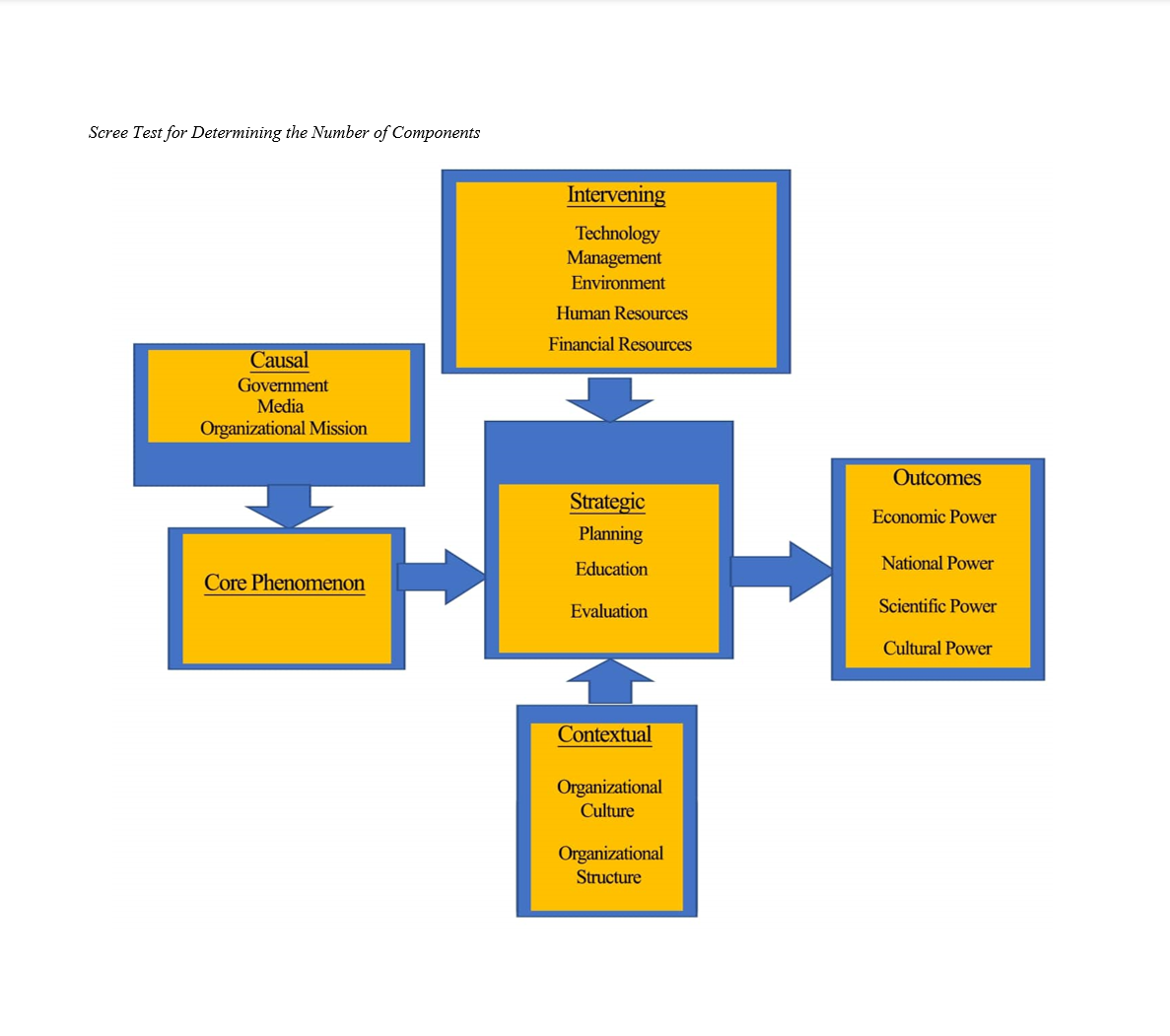Designing an Educational Model for a Knowledge-Based Resistance Economy at Islamic Azad University: A Qualitative Study
Keywords:
resistance economy, knowledge-based, causal factors, intervening factors, contextual conditions, strategies, outcomes, outputsAbstract
Objective: The objective of this study is to develop a competency model for managers at the Foundation of Martyrs and Veterans Affairs, focusing on the knowledge-based resistance economy.
Methods and Materials: This qualitative research employs a grounded theory approach using a systematic paradigm. Data were collected from 15 experts in human resource and educational management through semi-structured interviews. The interviews were analyzed using open, axial, and selective coding to identify 143 indicators, 22 components, and 5 dimensions.
Findings: The research identified five main dimensions: causal factors, contextual factors, intervening factors, strategies, and outcomes. These dimensions encompass 22 components, such as upstream documents, media, organizational mission, human resources, technology, financial resources, and planning. The model highlights the significant role of media, organizational structure, and human resource management in supporting the knowledge-based resistance economy.
Conclusion: The proposed model provides a comprehensive framework for developing competencies among managers in the Foundation of Martyrs and Veterans Affairs. It aligns with global trends in the knowledge-based economy and offers strategies for improving economic resilience, organizational effectiveness, and human capital development in line with the principles of the resistance economy.
Downloads
References
Alem Tabrizi, A., Donyayi, T., & Shokouh Yar, S. (2022). Designing a sustainable business model in development banks with a focus on resilient economy. Business Management Perspectives, 21(50), 156-182. https://jbmp.sbu.ac.ir/index.php/article_102883.html?lang=en
Alipour, Q., Kharashadi Zadeh, M. R., Seif, A. M., & Ahmadizadeh, S. S. R. (2020). Designing a strategic model for the role of elites and talents in achieving a knowledge-based economy with a resilient economy approach. Journal of Strategic National Defense Studies, 33-70. https://issk.sndu.ac.ir/article_1056_en.html
Alkali, U. (2021). Development of university‐industry interactions for knowledge-based economy in Nigeria. International Journal of Technology Management & Sustainable Development, 20(3), 265-284. https://doi.org/10.1386/tmsd_00045_1
Fard, M., Kabaranzad, M. R., & Haghighat Monfred, J. (2021). Designing a model for developing digital entrepreneurship in small and medium knowledge-based companies with a focus on resilient economy policies. Strategic Studies of Basij, 24(90), 103-140. https://www.bsrq.ir/article_134398_en.html?lang=en
Hedayat, D., Nadery, N., & Rezai, B. (2022). Designing a model for developing small and medium enterprises with an emphasis on the role of resilient economy. Scientific Journal of International Business Management. https://jiba.tabrizu.ac.ir/article_14815.html?lang=fa
Kamiab, S., Rahimi Sershabdarani, Q., & Hosseini, M. S. (2023). Financing methods for sports clubs with a resilient economy approach under sanctions. Sports Management Studies, 108-124. https://smrj.ssrc.ac.ir/article_3540.html?lang=en
Maleki, M., Ziaoddini, M., & Hadaei Nejad, M. (2019). Exploring the knowledge-based entrepreneurship model within the conceptual framework of a resilient economy. Scientific Journal of Islamic-Iranian Progress Studies, 7(14), 313-339. https://www.ipoba.ir/article_115489.html
Musselin, C. (2018). New forms of competition in higher education. Socio-Economic Review, 16(3), 657-683. https://doi.org/10.1093/ser/mwy033
Nasrabadi, D., & Mousavian, S. M. (2023). Strategic model for non-kinetic economic defense in achieving a resilient economy. Defense Economy, 8(28), 53-82. https://eghtesad.sndu.ac.ir/article_2570.html
Phale, K., Li, F., Adjei Mensah, I., Omari-Sasu, A. Y., & Musah, M. (2021). Knowledge-based economy capacity building for developing countries: A panel analysis in Southern African development community. Sustainability, 13(5), 2890. https://doi.org/10.3390/su13052890
Radu, M. (2023). Knowledge Economy: An Intangible Assets Based Economy. Journal of Eastern Europe Research in Business and Economics, 2023(2023), 906396. https://doi.org/10.5171/2023.906396
Rahbar, F., & Nikchehreh, G. A. (2020). Developing knowledge-based resilient economy strategies. Journal of Strategic National Defense Studies, 4(31), 2-272. https://issk.sndu.ac.ir/article_1062.html
Ranjbar Fallah, M., & Fatahi, H. (2024). Investing in start-ups in order to achieve a resilient economy and economic defense. Journal of Investment Knowledge, 13(49), 171-188. https://jik.srbiau.ac.ir/article_22042.html?lang=en
Safarzad, H., Azma, F., Saeidi, P., & Aghajani, H. (2020). Proposing a commercialization model for knowledge-based products focusing on resilient economy policies. Strategic and Macro Policies, 8(29), 3-22. https://www.jmsp.ir/article_102269.html
Ziyaei, M., Nikoomaram, H., & Hamadi, K. (2021). Designing a conceptual model for resilient economy in banks and financial institutions of the country. Marketing Management, 16(51), 1-28. http://journals.srbiau.ac.ir/article_17816.html

Downloads
Additional Files
Published
Submitted
Revised
Accepted
Issue
Section
License
Copyright (c) 2025 Manouchehr Sadeghian (Author); Baharak Shirzad Kebria (Corresponding Author); Fatemeh Hamidifar, Abbas Khorshidi (Author)

This work is licensed under a Creative Commons Attribution-NonCommercial 4.0 International License.















